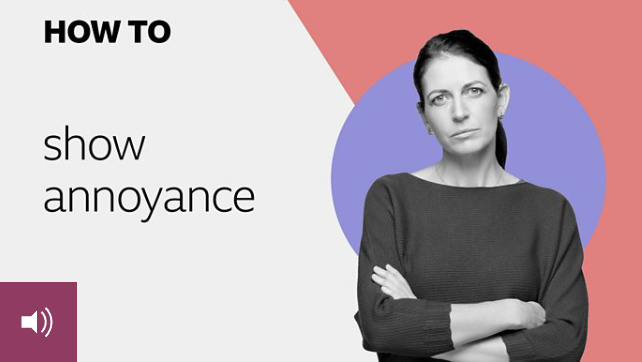In this programme, we look at language used to express annoyance or anger about something.
There are all sorts of very strong words in English used to show annoyance (some of which you probably already know!), but we’ll be focusing on those expressions which aren’t quite so offensive, so you don’t find yourself upsetting people too much!
Jackie
Hello. Welcome to How To with www.bbc-story.com. I’m Jackie Dalton.
In this programme, we’ll look at how to express anger and annoyance about something.
Of course, there are all sorts of very strong words in English used to show annoyance – some of which you probably already know!
But we’ll be focusing on those expressions which aren’t quite so offensive, so you don’t find yourself upsetting people!
Let’s hear our first one. I’m at a party drinking a glass of wine but then:
EXAMPLE
(Smash!)
Oh no!
Jackie
I drop my glass: Oh no! A simple reaction you can use in all kinds of situations when something bad has happened.
EXAMPLE
Oh no!
Oh no!
Jackie
You could also say, Oh dear! This means the same thing.
EXAMPLE
Oh dear!
Jackie
Let’s hear those words in sentences with other expressions:
EXAMPLES
Oh dear! He missed his plane!
Oh no! I can’t believe I’ve just done that!
Oh dear! I don’t believe he’s forgotten again!
Jackie
In those last sentences we heard another expression worth knowing: I can’t believe or I don’t believe. Again, a popular phrase when something bad has just happened.
EXAMPLES
Oh no, I can’t believe I’ve just done that!
Oh dear! I don’t believe he’s forgotten again!
Oh, I can’t believe it!
I can’t believe that this is happening again!
Oh, I can’t believe I’ve just done that!
Jackie
So those were our first three expressions: Oh no!, Oh dear! and, I can’t believe it! Here’s one you might use if something has gone wrong and it’s happened to you before.
EXAMPLE
Why does this always happen to me!
Jackie
Why does this always happen! Here are some more examples:
EXAMPLES
I’ve lost my keys. Why does this always happen to me!
They missed the train – why does that always happen!
Jackie
Listen to this clip of an angry boss. What expression does he start with to show he’s annoyed?
EXAMPLE
I mean, for goodness sake, he’d said he’d do it and now he hasn’t done it, so that’s just typical!
Jackie
For goodness sake! – something to say when you’re annoyed!
EXAMPLE
Person 1
He said he can’t help us!
Person 2
Oh for goodness sake!
Jackie
A variation on this is for heaven’s sake!
EXAMPLE
Oh! For heaven’s sake! Why is she so unreliable?
Jackie
One more handy and not too offensive expression is bother!
EXAMPLE
Person 1
Isn’t he coming to the party?
Person 2
Oh bother! I forgot to invite him!
Jackie
A word that you might hear in similar contexts, but which some people might find a bit offensive is damn!
EXAMPLES
Oh damn, they’ve cancelled the flight!
Damn! I’ve forgotten my car keys!
Jackie
Again, this is only for informal situations and some people might be a bit offended by the word; so do be careful about how you use it.
Now, let’s do a summary of the expressions we’ve looked at. Listen closely and try to remember as many as you can.
Oh dear!
Oh no!
I can’t believe it!
Why does this always happen!
For goodness sake!
For heaven’s sake!
Bother!
(And with caution) Damn!
Now, go on to practise the phrases we’ve looked at with the exercises on the website.
Language from the programme
Expressions for showing annoyance
Oh, dear!
Oh, no!
Bother!
Damn! (Some people may find this offensive.)
I can’t believe it!
Why does this always happen!
For
- goodness sake!
- heaven’s sake!
- Pete’s sake!
- pity’s sake!
- God’s sake! (Some people may find this offensive.)
